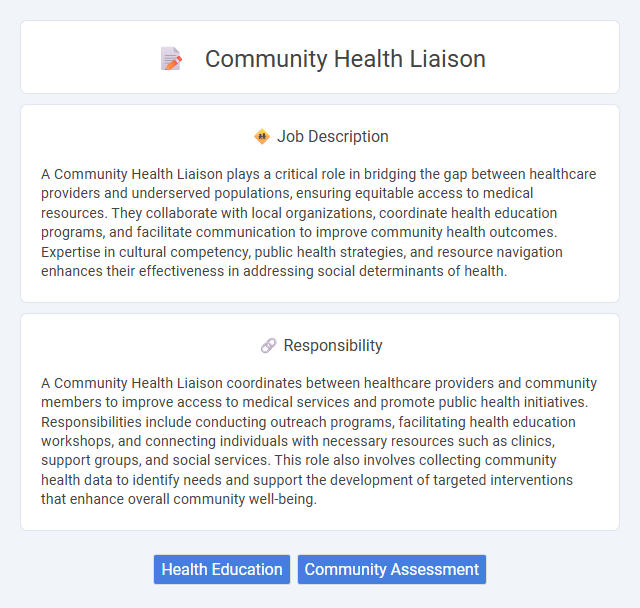
A Community Health Liaison plays a critical role in bridging the gap between healthcare providers and underserved populations, ensuring equitable access to medical resources. They collaborate with local organizations, coordinate health education programs, and facilitate communication to improve community health outcomes. Expertise in cultural competency, public health strategies, and resource navigation enhances their effectiveness in addressing social determinants of health.
Individuals experiencing strong interpersonal skills, empathy, and a passion for improving public health are likely well-suited for a community health liaison role. Those who thrive in collaborative environments and can effectively communicate with diverse populations may find this job fulfilling and impactful. People struggling with high-stress situations or lacking adaptability might face challenges in meeting the demands of this position.
Qualification
A Community Health Liaison typically requires a bachelor's degree in public health, social work, or a related field, alongside experience in community outreach and health education. Strong communication skills, cultural competence, and the ability to coordinate between healthcare providers and community members are essential qualifications. Certification in community health work or related areas may enhance employability and effectiveness in this role.
Responsibility
A Community Health Liaison coordinates between healthcare providers and community members to improve access to medical services and promote public health initiatives. Responsibilities include conducting outreach programs, facilitating health education workshops, and connecting individuals with necessary resources such as clinics, support groups, and social services. This role also involves collecting community health data to identify needs and support the development of targeted interventions that enhance overall community well-being.
Benefit
A Community Health Liaison job likely offers significant benefits such as fostering stronger connections between healthcare providers and local populations, which can improve access to medical services. The role probably enhances community well-being by addressing health disparities and promoting preventive care. Employees might also gain valuable experience in public health outreach and build extensive networks within community and medical sectors.
Challenge
Community health liaison roles often face the challenge of bridging communication gaps between healthcare providers and diverse populations, which can hinder effective care coordination. Limited resources and varying levels of health literacy among community members may complicate efforts to promote health equity and access. Overcoming distrust in healthcare systems requires persistent engagement and culturally sensitive approaches, potentially impacting the success of outreach initiatives.
Career Advancement
Community health liaison roles offer significant opportunities for career advancement through skill development in public health, communication, and program management. Professionals in this position can progress to roles such as public health coordinator, health education specialist, or healthcare program manager by gaining experience in community engagement and health promotion strategies. Mastery of data collection and analysis, along with building strong partnerships among healthcare providers and community organizations, enhances prospects for leadership positions in public health initiatives.
Key Terms
Health Education
A Community Health Liaison plays a critical role in health education by facilitating communication between healthcare providers and diverse community members to promote wellness and disease prevention. They design culturally appropriate educational programs that address local health concerns, improving community engagement and health literacy. Their efforts contribute to reducing health disparities and enhancing access to essential health resources.
Community Assessment
Community health liaisons play a critical role in conducting comprehensive community assessments to identify health needs, resources, and gaps within diverse populations. They collect and analyze qualitative and quantitative data from surveys, focus groups, and health records to inform targeted interventions and policy development. Effective community assessments by health liaisons support the design of culturally relevant programs that enhance public health outcomes and resource allocation.
 kuljobs.com
kuljobs.com